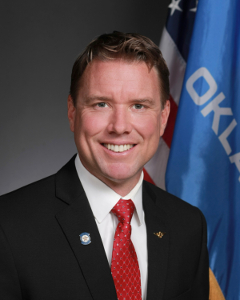In order to provide equal access and equal opportunity to people with diverse abilities, this site has been designed with accessibility in mind. Click here to view
Sen. Newhouse files legislation capping, eliminating tax preferences
 Sen. Joe Newhouse
Sen. Joe Newhouse
Although the 2017 session has not yet begun, freshman Sen. Joe Newhouse has already determined his focus for the next four years—helping address the need to revisit specific tax preferences in order to better manage public resources. Last month, the Oklahoma Incentive Evaluation Commission released a lengthy report focusing on 11 tax incentives. Newhouse has filed a slate of bills for the 2017 session largely based on the findings of that report.
“Oklahoma is facing its fourth straight year of budget shortfalls. While the world-wide downturn in oil prices certainly impacted our revenues, there are structural issues with the budget process that must be fixed,” said Newhouse, R-Broken Arrow. “If we continue to address the costly revenue drains and tax loopholes that have contributed to the current situation, then our state will be in much better shape when the economy rebounds.”
Newhouse, who earned his undergraduate degree in international economics at Georgetown University, said the legislation he’s filed will address tax preferences in a variety of areas. They include:
SB 552 reduces by three years the time period for new wind facilities to qualify to claim zero-emission income tax credits.
SB 556 creates a statewide annual cap of $5 million on credits for qualified expenditures to rehabilitate certain historical structures.
SB 74, SB 555 and SB 557 dealing with exemptions on aircraft excise taxes.
SB 558 eliminates the motor fuel tax credit for certain ethanol sales.
SB 554 sunsets the Quality Events Incentive Act at the end of June, 2017.
SB 567 establishes a July 1, 2017 sunset on the film rebate program.
SB 553 modifies the tuition reimbursement credit for aerospace industry employers.
“I applaud the work of my predecessor, Senator Mike Mazzei, in bringing to light the need to thoroughly examine this state’s many tax preferences and determine whether they should be continued, modified or ended,” Newhouse said. “It may be a few years before Oklahoma begins seeing a real savings from some of these changes but they will come and by continuing to scrutinize and address these tax preferences, we’re getting our financial house in order for future generations.”
 Oklahoma Senate
Oklahoma Senate

